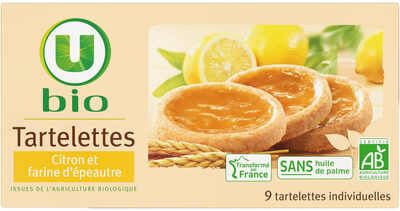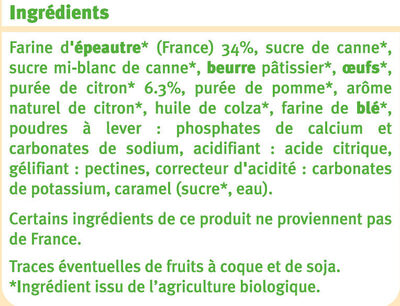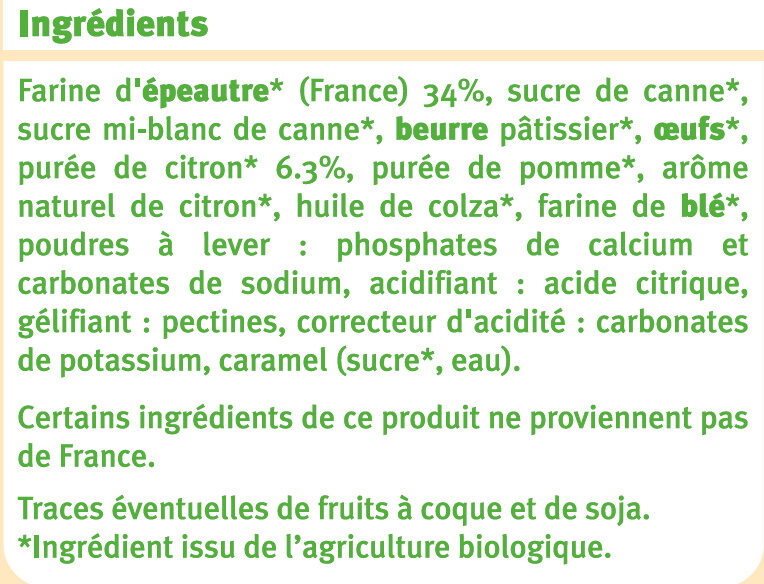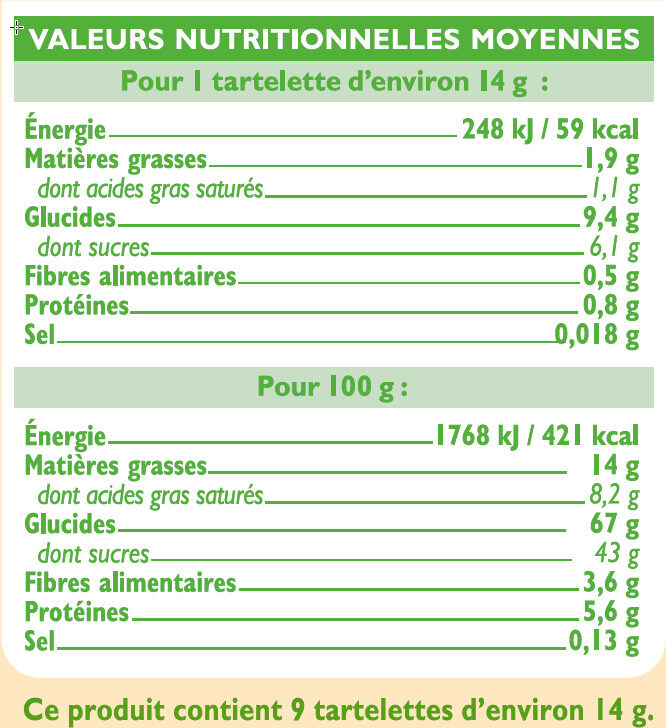Help us make food transparency the norm!
As a non-profit organization, we depend on your donations to continue informing consumers around the world about what they eat.
The food revolution starts with you!
Tartelette au citron et farine d'épeautre - U Bio - 125 g
Tartelette au citron et farine d'épeautre - U Bio - 125 g
This product page is not complete. You can help to complete it by editing it and adding more data from the photos we have, or by taking more photos using the app for Android or iPhone/iPad. Thank you!
×
Some of the data for this product has been provided directly by the manufacturer Système U.
Barcode: 3256224066200 (EAN / EAN-13)
Common name: Biscuits à la farine d'épeautre avec un nappage au citron issus de l'agriculture biologique
Quantity: 125 g
Packaging: Pack, fr:Emballages individuels plastique à jeter, fr:Pensez au tri!, fr:Triman, fr:Étui carton à recycler
Categories: Snacks, Sweet snacks, Biscuits and cakes, Biscuits
Labels, certifications, awards:
Organic, EU Organic, Non-EU Agriculture, EU Agriculture, EU/non-EU Agriculture, FR-BIO-01, No palm oil, Transformed in France, AB Agriculture Biologique

Manufacturing or processing places: France
Stores: Super U, Magasins U
Countries where sold: France
Matching with your preferences
Health
Ingredients
-
24 ingredients
: Farine de BLE (EPEAUTRE)* (France) 34%, sucre de canne*, sucre mi-blanc de canne*, BEURRE pâtissier*, OEUFS*, purée de citron* 6,3%, purée de pomme*, arôme naturel de citron*, huile de colza*, farine de BLE*, poudres à lever : phosphates de calcium, carbonates de sodium, acidifiant : acide citrique, gélifiant : pectines, correcteur d'acidité : carbonates de potassium, caramel (sucre*, eau). Traces éventuelles de fruits à coque et de soja. *ingrédient issu de l'agriculture biologique.Allergens: Eggs, Gluten, MilkTraces: Nuts, Soybeans
Food processing
-
Ultra processed foods
Elements that indicate the product is in the 4 - Ultra processed food and drink products group:
- Additive: E440 - Pectins
- Ingredient: Flavouring
- Ingredient: Gelling agent
Food products are classified into 4 groups according to their degree of processing:
- Unprocessed or minimally processed foods
- Processed culinary ingredients
- Processed foods
- Ultra processed foods
The determination of the group is based on the category of the product and on the ingredients it contains.
Additives
-
E330 - Citric acid
Citric acid is a natural organic acid found in citrus fruits such as lemons, oranges, and limes.
It is widely used in the food industry as a flavor enhancer, acidulant, and preservative due to its tart and refreshing taste.
Citric acid is safe for consumption when used in moderation and is considered a generally recognized as safe (GRAS) food additive by regulatory agencies worldwide.
-
E341 - Calcium phosphates
Calcium phosphate: Calcium phosphate is a family of materials and minerals containing calcium ions -Ca2+- together with inorganic phosphate anions. Some so-called calcium phosphates contain oxide and hydroxide as well. They are white solids of nutritious value.Source: Wikipedia
-
E440 - Pectins
Pectins (E440) are natural carbohydrates, predominantly found in fruits, that act as gelling agents in the food industry, creating the desirable jelly-like texture in jams, jellies, and marmalades.
Pectins stabilize and thicken various food products, such as desserts, confectioneries, and beverages, ensuring a uniform consistency and quality.
Recognized as safe by various health authorities, pectins have been widely used without notable adverse effects when consumed in typical dietary amounts.
-
E500 - Sodium carbonates
Sodium carbonates (E500) are compounds commonly used in food preparation as leavening agents, helping baked goods rise by releasing carbon dioxide when they interact with acids.
Often found in baking soda, they regulate the pH of food, preventing it from becoming too acidic or too alkaline. In the culinary world, sodium carbonates can also enhance the texture and structure of foods, such as noodles, by modifying the gluten network.
Generally recognized as safe, sodium carbonates are non-toxic when consumed in typical amounts found in food.
-
E501 - Potassium carbonates
Potassium carbonate: Potassium carbonate -K2CO3- is a white salt, which is soluble in water -insoluble in ethanol- and forms a strongly alkaline solution. It can be made as the product of potassium hydroxide's absorbent reaction with carbon dioxide. It is deliquescent, often appearing a damp or wet solid. Potassium carbonate is used in the production of soap and glass.Source: Wikipedia
Ingredients analysis
-
May contain palm oil
Ingredients that may contain palm oil: Butterfat
-
Non-vegan
Non-vegan ingredients: Butterfat, EggSome ingredients could not be recognized.
We need your help!
You can help us recognize more ingredients and better analyze the list of ingredients for this product and others:
- Edit this product page to correct spelling mistakes in the ingredients list, and/or to remove ingredients in other languages and sentences that are not related to the ingredients.
- Add new entries, synonyms or translations to our multilingual lists of ingredients, ingredient processing methods, and labels.
If you would like to help, join the #ingredients channel on our Slack discussion space and/or learn about ingredients analysis on our wiki. Thank you!
-
Vegetarian status unknown
Unrecognized ingredients: fr:bioSome ingredients could not be recognized.
We need your help!
You can help us recognize more ingredients and better analyze the list of ingredients for this product and others:
- Edit this product page to correct spelling mistakes in the ingredients list, and/or to remove ingredients in other languages and sentences that are not related to the ingredients.
- Add new entries, synonyms or translations to our multilingual lists of ingredients, ingredient processing methods, and labels.
If you would like to help, join the #ingredients channel on our Slack discussion space and/or learn about ingredients analysis on our wiki. Thank you!
-
Details of the analysis of the ingredients
We need your help!
Some ingredients could not be recognized.
We need your help!
You can help us recognize more ingredients and better analyze the list of ingredients for this product and others:
- Edit this product page to correct spelling mistakes in the ingredients list, and/or to remove ingredients in other languages and sentences that are not related to the ingredients.
- Add new entries, synonyms or translations to our multilingual lists of ingredients, ingredient processing methods, and labels.
If you would like to help, join the #ingredients channel on our Slack discussion space and/or learn about ingredients analysis on our wiki. Thank you!
: Farine de BLE (EPEAUTRE), Bio 34%, sucre de canne, sucre mi-blanc de canne, BEURRE pâtissier, OEUFS, purée de citron 6.3%, purée de pomme, arôme naturel de citron, huile de colza, farine de BLE, poudres à lever (phosphates de calcium), carbonates de sodium, acidifiant (acide citrique), gélifiant (pectines), correcteur d'acidité (carbonates de potassium), caramel (sucre, eau)- Farine de BLE -> en:wheat-flour - vegan: yes - vegetarian: yes - ciqual_proxy_food_code: 9410
- EPEAUTRE -> en:spelt - vegan: yes - vegetarian: yes - ciqual_food_code: 9001
- Bio -> fr:bio - labels: en:organic - percent: 34
- sucre de canne -> en:cane-sugar - labels: en:organic - vegan: yes - vegetarian: yes - ciqual_proxy_food_code: 31016
- sucre mi-blanc de canne -> fr:sucre-mi-blanc-de-canne - labels: en:organic - vegan: yes - vegetarian: yes - ciqual_proxy_food_code: 31016
- BEURRE pâtissier -> en:butterfat - labels: en:organic - vegan: no - vegetarian: yes - from_palm_oil: maybe - ciqual_food_code: 16401
- OEUFS -> en:egg - labels: en:organic - vegan: no - vegetarian: yes - ciqual_food_code: 22000
- purée de citron -> en:lemon-puree - labels: en:organic - vegan: yes - vegetarian: yes - ciqual_proxy_food_code: 13009 - percent: 6.3
- purée de pomme -> en:apple-puree - labels: en:organic - vegan: maybe - vegetarian: maybe - ciqual_food_code: 13050
- arôme naturel de citron -> en:natural-lemon-flavouring - labels: en:organic - vegan: yes - vegetarian: yes
- huile de colza -> en:colza-oil - labels: en:organic - vegan: yes - vegetarian: yes - from_palm_oil: no - ciqual_food_code: 17130
- farine de BLE -> en:wheat-flour - labels: en:organic - vegan: yes - vegetarian: yes - ciqual_proxy_food_code: 9410
- poudres à lever -> en:raising-agent
- phosphates de calcium -> en:e341 - vegan: yes - vegetarian: yes
- carbonates de sodium -> en:e500 - vegan: yes - vegetarian: yes
- acidifiant -> en:acid
- acide citrique -> en:e330 - vegan: yes - vegetarian: yes
- gélifiant -> en:gelling-agent
- pectines -> en:e440a - vegan: yes - vegetarian: yes
- correcteur d'acidité -> en:acidity-regulator
- carbonates de potassium -> en:e501 - vegan: yes - vegetarian: yes
- caramel -> en:e150 - vegan: yes - vegetarian: yes
- sucre -> en:sugar - labels: en:organic - vegan: yes - vegetarian: yes - ciqual_proxy_food_code: 31016
- eau -> en:water - vegan: yes - vegetarian: yes - ciqual_food_code: 18066
Nutrition
-
Bad nutritional quality
⚠ ️Warning: the amount of fruits, vegetables and nuts is not specified on the label, it was estimated from the list of ingredients: 6This product is not considered a beverage for the calculation of the Nutri-Score.
Positive points: 3
- Proteins: 3 / 5 (value: 5.6, rounded value: 5.6)
- Fiber: 3 / 5 (value: 3.6, rounded value: 3.6)
- Fruits, vegetables, nuts, and colza/walnut/olive oils: 0 / 5 (value: 6.3, rounded value: 6.3)
Negative points: 22
- Energy: 5 / 10 (value: 1768, rounded value: 1768)
- Sugars: 9 / 10 (value: 43, rounded value: 43)
- Saturated fat: 8 / 10 (value: 8.2, rounded value: 8.2)
- Sodium: 0 / 10 (value: 52, rounded value: 52)
The points for proteins are not counted because the negative points are greater or equal to 11.
Nutritional score: (22 - 3)
Nutri-Score:
-
Nutrient levels
-
Fat in moderate quantity (14%)
What you need to know- A high consumption of fat, especially saturated fats, can raise cholesterol, which increases the risk of heart diseases.
Recommendation: Limit the consumption of fat and saturated fat- Choose products with lower fat and saturated fat content.
-
Saturated fat in high quantity (8.2%)
What you need to know- A high consumption of fat, especially saturated fats, can raise cholesterol, which increases the risk of heart diseases.
Recommendation: Limit the consumption of fat and saturated fat- Choose products with lower fat and saturated fat content.
-
Sugars in high quantity (43%)
What you need to know- A high consumption of sugar can cause weight gain and tooth decay. It also augments the risk of type 2 diabetes and cardio-vascular diseases.
Recommendation: Limit the consumption of sugar and sugary drinks- Sugary drinks (such as sodas, fruit beverages, and fruit juices and nectars) should be limited as much as possible (no more than 1 glass a day).
- Choose products with lower sugar content and reduce the consumption of products with added sugars.
-
Salt in low quantity (0.13%)
What you need to know- A high consumption of salt (or sodium) can cause raised blood pressure, which can increase the risk of heart disease and stroke.
- Many people who have high blood pressure do not know it, as there are often no symptoms.
- Most people consume too much salt (on average 9 to 12 grams per day), around twice the recommended maximum level of intake.
Recommendation: Limit the consumption of salt and salted food- Reduce the quantity of salt used when cooking, and don't salt again at the table.
- Limit the consumption of salty snacks and choose products with lower salt content.
-
-
Nutrition facts
Nutrition facts As sold
for 100 g / 100 mlAs sold
per serving (14g)Compared to: Biscuits Energy 1,768 kj
(421 kcal)248 kj
(58 kcal)-9% Fat 14 g 1.96 g -30% Saturated fat 8.2 g 1.15 g -10% Carbohydrates 67 g 9.38 g +5% Sugars 43 g 6.02 g +49% Fiber 3.6 g 0.504 g +26% Proteins 5.6 g 0.784 g -10% Salt 0.13 g 0.018 g -79% Fruits‚ vegetables‚ nuts and rapeseed‚ walnut and olive oils (estimate from ingredients list analysis) 6.3 % 6.3 %
Environment
-
Eco-Score B - Low environmental impact
⚠ ️Select a country in order to include the full impact of transportation.The Eco-Score is an experimental score that summarizes the environmental impacts of food products.→ The Eco-Score was initially developped for France and it is being extended to other European countries. The Eco-Score formula is subject to change as it is regularly improved to make it more precise and better suited to each country.Life cycle analysis
-
Average impact of products of the same category: B (Score: 69/100)
Category: Biscuit (cookie)
Category: Biscuit (cookie)
- PEF environmental score: 0.35 (the lower the score, the lower the impact)
- including impact on climate change: 2.88 kg CO2 eq/kg of product
Stage Impact Agriculture
80.5 %Processing
11.8 %Packaging
3.1 %Transportation
3.2 %Distribution
1.4 %Consumption
0.0 %
Bonuses and maluses
-
Labels with high environmental benefits
Bonus: +15
-
AB Agriculture Biologique
Organic agriculture contributes to preserve biodiversity, climate, water quality and soil fertility.
Organic food is food produced by methods complying with the standards of organic farming and features practices that cycle resources, promote ecological balance, and conserve biodiversity.
-
EU Organic
Organic agriculture contributes to preserve biodiversity, climate, water quality and soil fertility.
Organic food is food produced by methods complying with the standards of organic farming and features practices that cycle resources, promote ecological balance, and conserve biodiversity.
-
-
Origins of ingredients with a high impact
Malus: -2
Environmental policy: -2
Transportation: 0
Origin of the product and/or its ingredients % of ingredients Impact Unknown 66 %High France 34 %Medium
-
Packaging with a high impact
Malus: -15
Shape Material Recycling Impact Packet Plastic Discard High Sleeve Cardboard Recycle Low Packet Unknown High ⚠ ️ The information about the packaging of this product is not sufficiently precise (exact shapes and materials of all components of the packaging).⚠ ️ For a more precise calculation of the Eco-Score, you can modify the product page and add them.
If you are the manufacturer of this product, you can send us the information with our free platform for producers.
Eco-Score for this product
-
Impact for this product: B (Score: 67/100)
Product: Tartelette au citron et farine d'épeautre - U Bio - 125 g
Life cycle analysis score: 69
Sum of bonuses and maluses: -2
Final score: 67/100
-
Carbon footprint
-
Equal to driving 1.5 km in a petrol car
288 g CO² per 100g of product
The carbon emission figure comes from ADEME's Agribalyse database, for the category: Biscuit (cookie) (Source: ADEME Agribalyse Database)
Stage Impact Agriculture
82.9 %Processing
7.9 %Packaging
3.8 %Transportation
4.7 %Distribution
0.7 %Consumption
0.0 %
Packaging
-
Packaging with a high impact
-
Packaging parts
Sleeve (Cardboard)
Packet (Plastic)
Packet
-
Packaging materials
Material % Packaging weight Packaging weight per 100 g of product Paper or cardboard Plastic Total
-
Transportation
-
Origins of ingredients
Origins of ingredients with a high impact
Origin of the product and/or its ingredients % of ingredients Impact Unknown 66 %High France 34 %Medium
Labels
-
AB Agriculture Biologique
Organic agriculture contributes to preserve biodiversity, climate, water quality and soil fertility.
Organic food is food produced by methods complying with the standards of organic farming and features practices that cycle resources, promote ecological balance, and conserve biodiversity.
-
EU Organic
Organic agriculture contributes to preserve biodiversity, climate, water quality and soil fertility.
Organic food is food produced by methods complying with the standards of organic farming and features practices that cycle resources, promote ecological balance, and conserve biodiversity.
Report a problem
-
Incomplete or incorrect information?
Category, labels, ingredients, allergens, nutritional information, photos etc.
If the information does not match the information on the packaging, please complete or correct it. Open Food Facts is a collaborative database, and every contribution is useful for all.
Data sources
Product added on by aleene
Last edit of product page on by roboto-app.
Product page also edited by beniben, kiliweb, openfoodfacts-contributors, org-systeme-u, packbot, quechoisir, rgjc, systeme-u, systeme-u-off, yuka.WW80RlRJazcrYUVVb3ZjZDlFL3cyUEY1dzgrWERHV3VEL2NSSWc9PQ.













